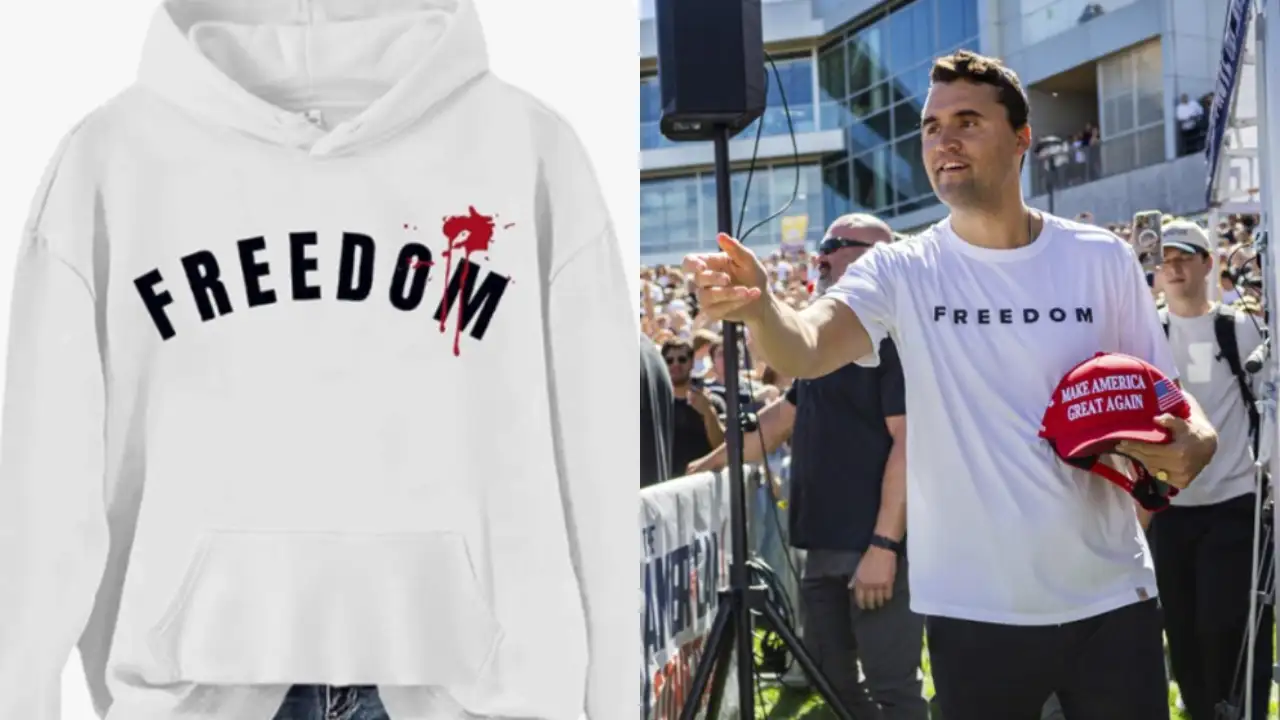By Shriya Kataria
Copyright breezyscroll

When conservative activist Charlie Kirk was fatally shot during a Turning Point USA event last week, the internet’s response was almost instantaneous. Hours after news of his death spread, a plain white T-shirt bearing the word “Freedom”, the shirt Kirk was wearing at the time, appeared for sale across dozens of print-on-demand sites.
Within a day, Etsy storefronts, TikTok shops, and independent sellers were churning out replicas, often with slight variations. Some even claimed to offer “official” versions, though many were low-quality knockoffs manufactured in bulk overseas. The phenomenon revealed a collision of grief, politics, and internet consumerism—and sparked a fierce debate over where the line between commemoration and exploitation should be drawn.
Why Did the “Freedom” Shirt Go Viral?
Kirk’s shirt struck a cultural nerve because of its simplicity and timing. In black block letters, “Freedom” is a slogan broad enough to resonate across political divides, yet in this case, it became inseparable from his legacy.
D. Andrew Price, who tracks viral trends at Memes Media Group, argued that the shirt’s appeal lies in its blend of identity and accessibility. “It’s where cultural symbolism and cheap viral consumerism intersect,” he said. “Anyone can print a shirt that says ‘freedom,’ but in this context, it carries a story.”
Add to that the mechanics of today’s online economy:
Print-on-demand services allow sellers to upload a design and begin selling within hours.
Algorithms on TikTok and Etsy prioritize trending terms, pushing the shirts further into public view.
Memetic culture thrives on remixing—leading to parodies, Bible verse add-ons, and even mocking counter-shirts before platforms removed them.
The result: the “Freedom” shirt quickly shifted from clothing to viral artifact.
Backlash Against Commercialization
The rush to monetize Kirk’s death didn’t sit well with many of his supporters. Prominent conservative account Libs of TikTok criticized sellers for profiting from tragedy, calling the behavior “exploitative.”
Adding fuel to the anger were instances of left-leaning vendors creating satirical versions of the shirt. Some mocked Kirk directly, though those listings disappeared after swift public backlash and platform takedowns.
The episode illustrates a recurring ethical tension: when tragedy meets online commerce, who controls the narrative—and who should profit?
Official vs. Unofficial Merchandise
By Friday, Kirk’s personal website stepped in to reclaim the message, launching an official “Freedom” T-shirt. Proceeds are being directed to his family and organization, according to the site.
Supporters like Natalie Danelishen of Ohio said they waited for the official release. “I didn’t want to buy something from some random seller in another country,” she told reporters. “This way I know the money is going back to his cause.”
Meanwhile, Turning Point USA introduced a separate product: a shirt featuring a line drawing of Kirk in a suit, fist raised, alongside the biblical verse from Isaiah: “Here I am Lord, send me.”
Early confusion between the two designs suggests that even loyal supporters struggled to distinguish between official memorial items and opportunistic spinoffs.
Small Businesses Step In
Not all unofficial sellers were looking to profit. Jessica Peters, who runs a small embroidery shop called Life’s a Stitch, began offering $12 T-shirts and $25 hooded sweatshirts featuring “Freedom,” an American flag patch, and a Bible verse. She pledged to donate all profits.
Her move highlights a middle ground between opportunism and solidarity: small entrepreneurs responding to customer demand while redirecting funds toward causes aligned with Kirk’s values.
From Tribute to Meme: What the Shirt Represents Now
Beyond commerce, the “Freedom” shirt has taken on a life of its own as a cultural meme. Scholar Susana Tosca, who studies online storytelling, notes that internet culture rewards simplicity and remix potential. A single word, bold typography, and clear symbolism make the shirt ideal for viral spread.
As Tosca put it: “Online culture thrives on artifacts that can be shared, copied, and reinterpreted endlessly. This shirt is already more than an object—it’s a template.”
That template now sits at the intersection of:
Political identity: For Kirk’s supporters, the shirt represents his final stand.
Consumer behavior: For sellers, it’s a low-cost way to tap into viral demand.
Cultural commentary: For critics, it’s an example of how quickly mourning can be commodified.
Why It Matters
The story of Kirk’s “Freedom” shirt is less about fashion than about how grief, politics, and commerce collide in the digital age. The speed of replication underscores how internet platforms—optimized for trends, not ethics—shape the aftermath of public figures’ deaths.
It also raises practical questions:
Should platforms regulate opportunistic memorial merchandise?
Can “official” releases ever keep pace with viral knockoffs?
And most crucially, who benefits financially when cultural artifacts emerge from tragedy?
remembered butFor now, the “Freedom” shirt is both memorial and meme, embraced and critiqued, and sold in official shops and shadowy corners of the internet. Its rapid transformation reveals not just how Kirk will be remembered, but how internet culture remembers anyone.
Charlie Kirk’s death turned the plain white “Freedom” T-shirt he was wearing into a viral product. Knockoffs flooded Etsy and TikTok within hours, sparking backlash over profiteering. Official versions later emerged from Kirk’s website and Turning Point USA, while some small businesses pledged profits to charitable causes. Experts say the shirt has already become a meme—symbolizing how online culture commodifies tragedy at lightning speed.



